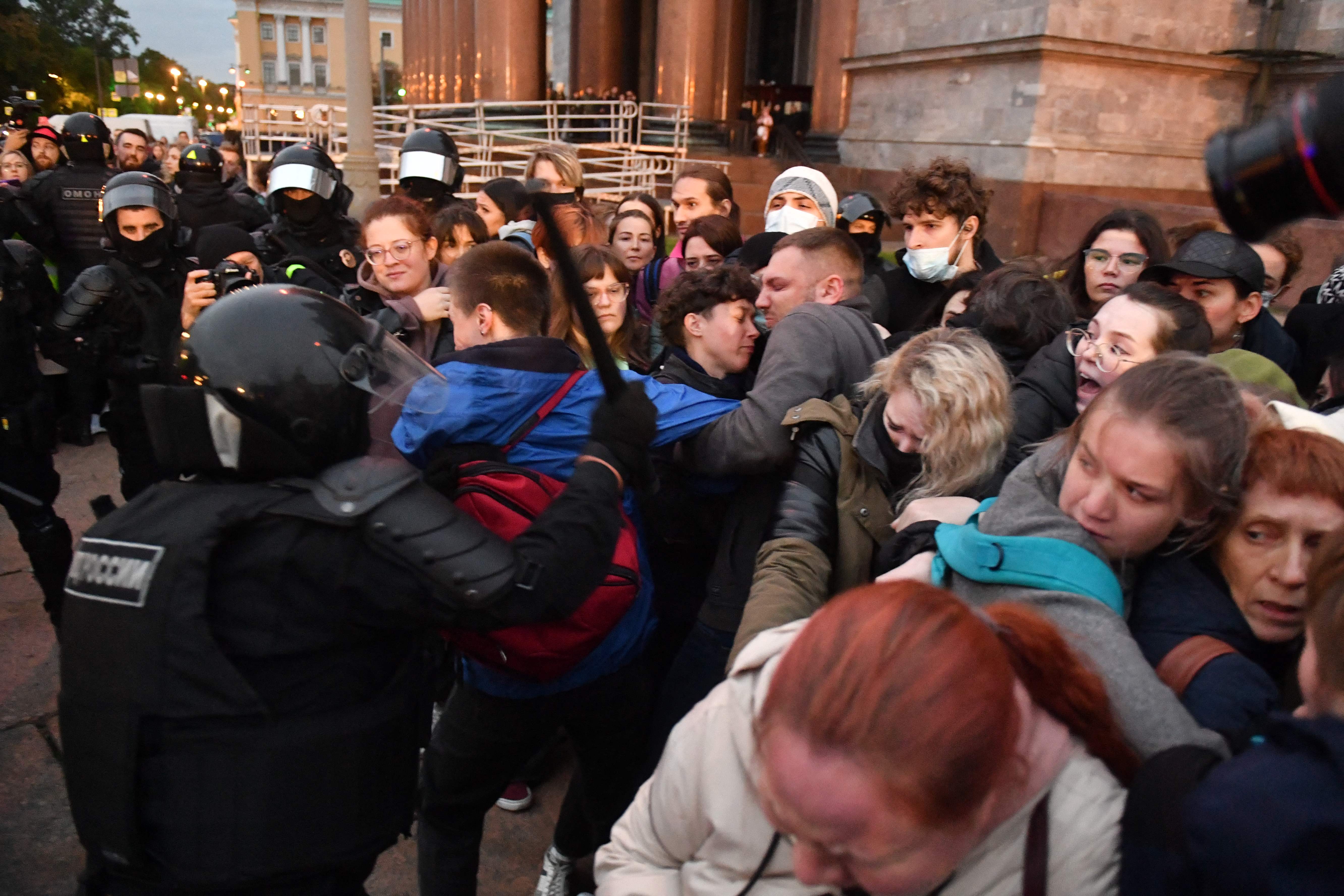More than 1,300 arrested in anti-war protests across Russia
Demonstrators heard shouting ‘send Putin to the trenches’
Your support helps us to tell the story
From reproductive rights to climate change to Big Tech, The Independent is on the ground when the story is developing. Whether it's investigating the financials of Elon Musk's pro-Trump PAC or producing our latest documentary, 'The A Word', which shines a light on the American women fighting for reproductive rights, we know how important it is to parse out the facts from the messaging.
At such a critical moment in US history, we need reporters on the ground. Your donation allows us to keep sending journalists to speak to both sides of the story.
The Independent is trusted by Americans across the entire political spectrum. And unlike many other quality news outlets, we choose not to lock Americans out of our reporting and analysis with paywalls. We believe quality journalism should be available to everyone, paid for by those who can afford it.
Your support makes all the difference.Teenagers and journalists were among the hundreds of people detained by Russian police as Vladimir Putin’s move to enlist civilians for his war in Ukraine sparked the country’s first mass protests in months.
Some 1,386 people were arrested by Russian authorities as demonstrations broke out in dozens of cities across the country, according to the independent monitoring group OVD-Info – as crowds in Moscow chanted: “Send Putin to the trenches.”
Among those detained were nine journalists and 33 teenagers, at least one of whom was allegedly beaten on the head and ribs, and thrown from a police van, according to the group.
It was unclear if there would be further protests on Thursday.
The dissent broke out after Mr Putin announced the country’s partial mobilisation in a bid to rescue his ailing war effort in Ukraine, calling up as many as 300,000 reservists.
“We are talking about partial mobilisation, that is, only citizens who are currently in the reserve will be subject to conscription, and above all, those who served in the armed forces have a certain military speciality and relevant experience,” Mr Putin said.
As demonstrators made their opposition visible in the streets of at least 39 Russian cities on Thursday, draft-age men began to flee the country, with one-way plane tickets out of the country to visa-free destinations either selling out or rocketing in price.
Meanwhile, jailed Russian opposition politician Alexei Navalny appeared to confirm reports that his associates successfully prank-called Kremlin spokesman Dmitry Peskov’s son, posing as military recruiters. Nikolai Peskov told them that he “had no desire to fight” because he was “engaged in education”.
It came as the Kremlin-backed RT website, citing law enforcement sources, reported that Mr Navalny had been hit with fresh extremism charges in relation to his calls from prison for his supporters to protest against Mr Putin’s war earlier this year.

The additional charges could result in a further 15 years in prison, the website claimed.
Mr Navalny again called for people to protest in response to Mr Putin’s announcement on Wednesday, also publishing the results of a poll by his Anti-Corruption Foundation which found nearly half of respondents disagreed with the president’s dramatic move.
“These results show why mobilisation could be Putin’s last mistake,” Mr Navalny said.
Monitoring group OVD-Info alleged that in many cities, protesters were beaten and denied access to their lawyers.
There were said to be at least 530 detainees each in Moscow and St Petersburg, with one demonstrator’s arm alleged to have been broken in two places in the Baltic Sea port city.
While the brave display of unrest marks the first large-scale Russian protests in months, noticeable opposition to Mr Putin’s war has been constant since the invasion of Ukraine in February, with OVD-Info counting some 16,500 arrests over the past seven months.
The demonstrations came as Mr Putin announced that four referenda would be held in seized Ukrainian regions on becoming part of Russia, with the imminent votes – widely expected to be a “sham” – paving the way for their annexation.
And in an apparent threat to the West, the Russian president warned against “nuclear blackmail”, threatening that he was “not bluffing” over using all the means at his disposal to protect Russia’s territory.
Former Russian president Dmitry Medvedev – now deputy chair of Moscow’s security council – said on Thursday that Russia could c use tactical nuclear weapons to defend Ukrainian territories seized in the newly-announced referenda.
The votes will go ahead and “there is no going back”, Mr Medvedev said, adding: “The Western establishment and all citizens of Nato countries in general need to understand that Russia has chosen its own path.”


Join our commenting forum
Join thought-provoking conversations, follow other Independent readers and see their replies
Comments